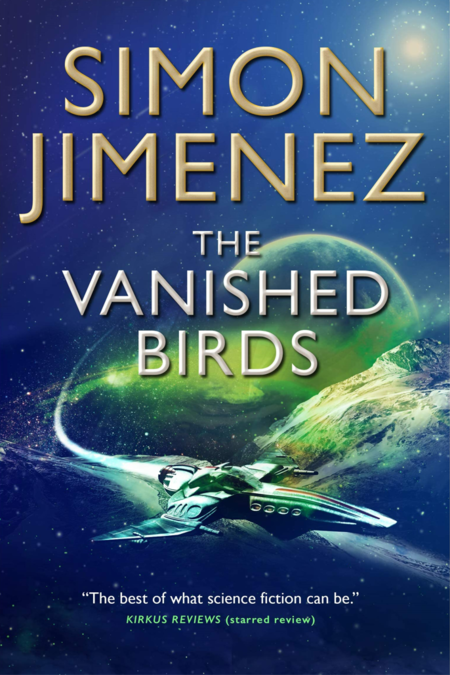Every novel worth its narrative salt should have an emotional hook that ensnares your reader heart.
But there’s something about the emotionally evocative wonder that is The Vanished Birds, the debut book by promising writer Simon Jimenez, that captures your heart (and mind and soul) far more deeply and irrevocably than many other novels occupying the genre.
It is, for all intents and purposes, an enthralling space opera in which we are introduced to a spaceborn human diasporic civilisation, 1000 years into their flight from Earth, which lies broken and ruined so far hence from what is known as Allied Space, that is initially a myth and legend and nothing more.
In this brave new world, or that should be worlds, human life has become corporatised, the end result of colonisation efforts driven by companies who competed with each other to build space stations, populate virginal worlds – there are no aliens in this part of the galaxy, or, perhaps ominously, none remaining anyway; the corporations are ruthless and honestly genocide is not something they wouldn’t contemplate – and make money, lots and lots of money.
You are less a citizen of these entities as you are a person under contract; observe the full scope of your contractual obligations and you are fine, violate them and, well, you don’t want to violate is the best way to think about that.
Essentially if you play by the rules, you will enjoy privilege and care but fail to do so and the full weight of corporate law falls upon you, a sentence so harsh that one character in the book finds herself, and many others, condemned without so much as the whisper of a trial.
“And as he explained to her for the second time that day why it was funny that the nephew ended up in bed with the one-armed man’s wife, she rubbed one hand against the armrest of her chair, centering herself on the tactile sensation, and told herself that what happened in the boy’s room was just a trick of body chemistry, an explainable thing, and because it was explainable, it was something she could control.” P. 49)
One person who has enjoyed a relatively charmed existence, at least up until this point, is transport ship captain Nia Imani who, along with her crew, spends her days going from planet to planet on eight-month hops collecting dhuba seeds for supply back to corporate HQ on Pelican station, one of the four stations that makes up the interplanetary concerns of Umbai corporation.
What is eight months in time for Nia, who like all of Allied Space benefits from the travel speed-enhancing properties of folded space, is 15 years for the residents of planet such as Umbai V who live a bucolic way of life, almost feudal in a sense, where life revolves around Shipment Day when Nia and her crew come down to collect the seeds and a festival ensues.
At first, this seems like some sort of rural idyll, and for the people who know no more, that’s very much the case but as the narrative of The Vanished Birds wings its way onwards across time and the galaxy, it becomes apparent that there is something quite rotten in the corporatised state of Denmark.
But as The Vanished Birds Nia is happy in her established life, the people of Umbai V are happy in theirs, the status quo are receiving a seismic jarring when a young boy crashes into the planet, eventually ending up in Nia’s care as the dhuba seed farmers seek to get him off their superstition-throttled world.

While the action kicks off from that point, especially when Fumiko Nakajima, the millennia-old matriarch of the Umbai stations, all of which are modelled and named after long-extinct Earth birds – in one poignant part of the novel, we bear witness through Fumiko of the planet’s slide into uninhabitable oblivion, just one example of how Jimenez creates character and background with prose that is at once profoundly poetic and emotional impactful – realises that the boy, eventually called Ahro, is the person she has been seeking for centuries.
His particular skills, which are unknown to him but which may prove pivotal to the eventual make-up of Allied Space, are much in demand, and fuel much of the plot’s driving forward momentum but what sits at the heart of The Vanished Birds is the tightly loving bond that forms between Nia and Ahro who move from simply guardian and bewildered charge to mother and son in all but name.
It is their relationship that makes the sizable beating heart of the novel, their bond so strong and unyielding, and moving in ways that will seize your heart beyond any hope of release, and which gives The Vanished Birds an raw, impactful intimacy that sits easily inside its vaulting, immersive expansiveness.
“She curled her arms over herself, pressed the flute to her chest. All the years she had given up to the Pocket. The sacrifices that were now irrelevant. There would be no more lost time. No more derelicts stranded in the fringe with hope of rescue. No more last goodbyes to old friends. No skipping across the entire lifetimes of forgotten lovers. It was so beautiful, and so horrible, she couldn’t breathe.” (P. 379)
This beguiling mix of the intimate and the space operatic works because Jimenez, a writer of uncommon skill who addresses big emotional human moments and epochal punctuation points in history with a quiet intensity that still gives them their narrative due, and whose writing is lyrically poetic that still feels very real and grounded.
It is a near-perfect sci-fi novel, one which sees humanity comfortably amid the stars, though without the futuristic idealism that marks forward-thinking ideas of future us like Star Trek – in this reality, many of humanity’s great foibles such as greed, cruelty and brutal hierarchy are unchanged, having simply gone to the stars without alteration – because while it dreams big, it also knows that the heart of even the most sprawling of tales is the quiet power and purpose of the human heart.
It has real, palpable, moving humanity at its heart, and as we get to know Nia and Ahro, and her crew, come to understand what drives Fumiko and the corporation who sees her as both saviour and liability, The Vanished Birds comes vividly alive with nuance and truth about the human condition that make a real and lasting impact.
A novel which dances between fate, family and humanity (thanks to the back cover blurb which captures the novel’s themes perfectly), The Vanished Birds is a gem of a read – a book which takes you to the stars even as it pulls back the curtain to reveal the cold, broken heart of much of humanity, all while going in deeply, quietly, poignantly and evocatively to the beautiful togetherness of Nia and Ahro who come to prove that while corporations might flex their muscles with regular damage done (some of its horrifically traumatic), it is the power of the human heart that really has the ability to shape galaxies, destinies and overcome obstacles beyond measure.
